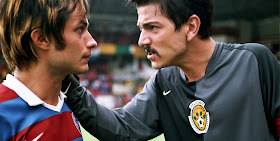
The credits for Rudo y Cursi read like a Who's Who of contemporary Mexican cinema. Listed among the producers are Alfonso Cuarón, Guillermo del Toro and Alejandro González Iñárritu; three directors who, between them, have been responsible for some of the decade's most acclaimed films. The central roles are taken by Gael García Bernal and Diego Luna, the actors who co-starred in 2001's Oscar-nominated Y tu mamá también, and who have since gone on to star in a variety of American and Mexican productions. And Rudo y Cursi has been written and directed by Carlos Cuarón, Alfonso's younger brother, who co-wrote Y tu mamá también and who is making his feature debut here. It has been almost a decade since these individuals first came to prominence on the crest of the Mexican New Wave, and Rudo y Cursi has the feel of a timely reunion.
Unfortunately, the film isn't an especially impressive or memorable effort, particularly coming from such a renowned group. Tato (Bernal) and Beto (Luna) are brothers living in the small coastal town of Cihuatlán, where they earn a living on a banana plantation. On weekends, they turn out for the local football team – Beto is the goalkeeper, while Tato is the star striker – and it is their good fortune one morning to run into a talent scout on their way to a match. His name is Batuta (Guillermo Francella), and although we can instantly see a shady side to this character, he offers both Tato and Beto a chance to sign up for rival teams in Mexico City. It's a pity Batuta's involvement doesn't end there, as we would have then been spared his incessant, grating voiceover, in which he tries to imbue various aspects of football matches with philosophical meaning, with his musings frequently straying into Swiss Toni territory ("Kicking a ball is very much like making love to a beautiful woman").
Batuta's redundant narration, repeatedly spelling things out for us instead of letting us discover them for ourselves, is symptomatic of the script's flaws. Much of what takes place in Rudo y Cursi feels dully over-familiar, with both characters following a predictable arc, hitting the brief heights before their fortunes downturn sharply. Tato, who cherishes pop stardom over footballing fame, becomes a star (earning the nickname "Cursi", meaning corny or vulgar), records a cheesy pop record and gets involved with a gold-digging TV presenter (Jessica Mas), who'll stay with him as long as he continues scoring on the pitch. Beto is much more serious about his career than his brother (he gets nicknamed "Rudo" or "Rough" for his aggressive approach), and he starts setting goalkeeping records before his chronic gambling problem lands him in trouble with some local thugs. You probably won't be surprised to hear that the film climaxes with the two brothers facing each other in a high-stakes match, which comes down to a last-minute penalty kick.
As a director, Cuarón doesn't do much to freshen up his own hackneyed storytelling on screen. Aside from the interesting decision to focus almost solely on crowd reaction shots rather than showing us the on-pitch action, he generally lets the film drift along in an easygoing, unimaginative fashion. Rudo y Cursi lacks the energetic rambunctiousness that characterised Y tu mamá también, and whereas that film's horny humour was carefully tempered by an increasing emotional depth, the darker elements of this story feel as if they have been clumsily shoehorned into the mix. The one area in which Rudo y Cursi doesn't suffer from comparison with Alfonso Cuarón's film is in the level of performance offered by the two stars. They both go for broad characterisations – Bernal as a naïve playboy, Luna as a tightly wound hothead – and they are both charming and often very funny. Given the amount of talent contributing to Rudo y Cursi, one might have expected a better showcase for their considerable abilities.
